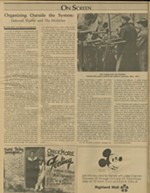sex, lies, and videotape; King of the Hill; Out of Sight
Reviewed by Louis Black, Fri., Oct. 15, 1999
sex, lies, and videotape
D: Steven Soderbergh (1989); with James Spader, Andie MacDowell, Peter Gallagher, Laura San Giacomo.King of the Hill
D: Steven Soderbergh (1993); with Jesse Bradford, Jeroen Krabbé, Lisa Eichhorn, Karen Allen, Spalding Gray, Elizabeth McGovern.Out of Sight
D: Steven Soderbergh (1998); with George Clooney, Jennifer Lopez, Ving Rhames, Steve Zahn, Dennis Farina, Albert Brooks, Don Cheadle, Catherine Keener, Nancy Allen.Watching Steven Soderbergh's new film, The Limey, at the Austin Film Society's benefit premiere the other night, I was again reminded of his cinematic brilliance and skill at narrative storytelling. Soderbergh's filmography is so fascinating not because of a clear authorial style. His films do not look the same, revolve around similar topics, or obsess on certain obvious themes (though subtle ones manifest themselves). Instead, these films make sense as shaped by an adventurous intelligence, driven by an interest in the tactical quality of media (how does media present itself, how is meaning made and stories told), complemented by a deep insight into the human comedy. sex, lies, and videotape in 1989 revolutionized American cinema. Theatrically, as an "independent film," its success had such effects as presenting independent films as viable commercial releases and helping to establish the Sundance Film Festival as a major market. But the real influence was aesthetic: sex, lies ... was a knockout punch both stylistically and thematically. Populated with startlingly good new talent, it told an adult story that couldn't help itself from meditating on the nature of visual media. Centered on the very different visual textures of video and film, the plot is all about how we tell stories to ourselves mundanely and daily, how we are wrapped in the dense web of our own personal narratives. sex, lies ... influenced a generation of new filmmakers to go out and try something different. It raised the bar in terms of thematic ambition and cinematic storytelling sophistication. Kafka (1991), which followed, seemed a misstep, but it probably deserves being watched again.
The extent of Soderbergh's talent became obvious with King of the Hill, his third film, adapted by the director from A.E. Hotchner's autobiography. A straight-ahead narrative, this powerful tale of a boy coming of age during the Depression is a wonder. The family of Aaron Kurlander (Bradford) starts at the bottom of the social ladder and then rapidly heads south. His younger brother is sent away because the family can't afford to keep him. The mother is hospitalized. The father gets a traveling sales job and leaves the boy home alone. That's when things really start to go bad. Instead of being a depressingly dark gauntlet run of one bruising incident after another, however, Aaron's enthusiasm for life has him sailing by, though not usually easily, life's obstacles. Some of the film's optimism may be because we know that this swept and battered little boy will go on to find success as a writer (most notably for his Hemingway biography). More importantly, Soderbergh's cinematic storytelling breathes remarkable life and energy into the film. Instead of a tale of woe, it has the same life-affirming sense of the struggle as My Life as a Dog (Lasse Hallström, 1985). My wife's mother, who went to school with Hotchner, remembers him as a grubby little kid. I mentioned this to Soderbergh, who replied that Hotchner had told him that if only he had been as good-looking as the kid in this movie, life would have been easier.
The Underneath (1995), Soderbergh's next movie, was shot here in Austin. An ambitious neo-film noir, it doesn't completely work. In 1996, Soderbergh released two films that had him working in some new areas, the personal experimental film Schizopolis and Gray's Anatomy, his cinematic rendition of a Spalding Gray performance piece. I haven't seen either but am told that Schizopolis is Soderbergh working out a lot of filmic ideas, generally just playing around.
Out of Sight marks a masterful return to ambitious storytelling, and though it underperformed at the box office, it was one of the best films of last year. Based on Elmore Leonard's novel, Out of Sight relates the unlikely romance between an escaped con (Clooney) and a deputy federal marshal (Lopez). Given that Clooney is on the lam and Lopez is chasing him, this relationship generates a lot of interesting spins. With simply a terrific cast and the narrative razzle-dazzle of master Leonard at his best (beautifully adapted by screenwriter Scott Frank), Soderbergh must have had a hell of a good time making this movie. The ambitious storytelling (though not as ambitious as The Limey) has the director using flash forwards and flashbacks to help fill out his chronological story. The thrill here is the cast, all clicking at their best against the lush noirish background Soderbergh offers up. Think of this as preparation for The Limey, which furthers the narrative experiments of Out of Sight while telling a taut tale of revenge.










